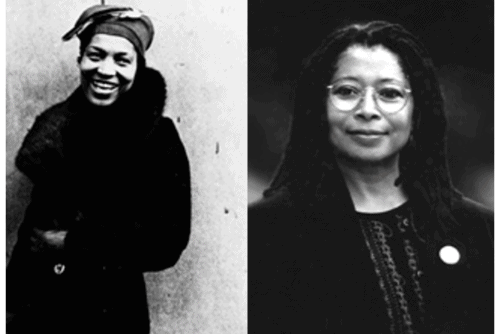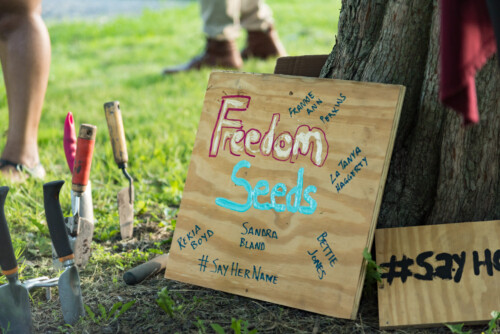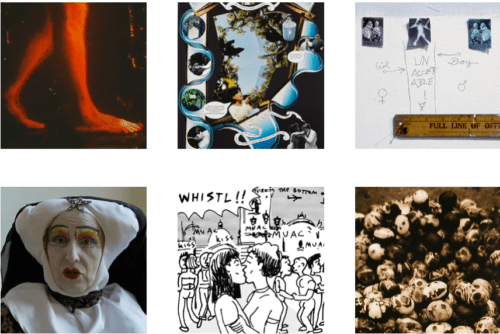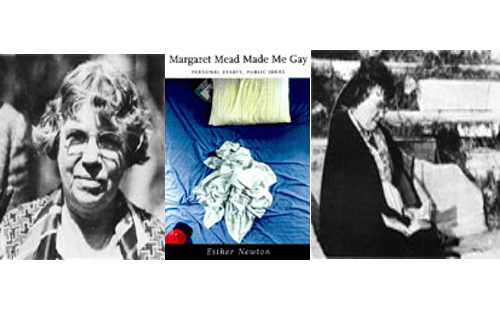Editor’s Note: The explosion of interest in Hurston has resulted in a truly impressive body of scholarly work. As a result, this bibliography can only be incomplete. Included here are Hurston’s major works; books and articles related to Hurston by the contributors to this volume; monographs on Hurston; and, a small selection of articles on Hurston published in the last 10 years, 1995-2004. These articles are those that have become “classics” in the field as well as those that seem to be taking Hurston studies in interesting new directions, including investigations into topics such as Hurston’s work in the Caribbean and her diasporic consciousness, Hurston as a filmmaker, Hurston and US regional studies (Florida, New Orleans), Hurston and music/language, Hurston and whiteness studies, Hurston and the Federal Writer’s Project.
Abel, Elizabeth. “Black Writing, White Reading: Race and the Politics of Feminist Interpretation. Feminisms: An Anthology of Literary Theory and Criticism. New Brunswick: Rutgers University Press, 1997.
Alice Walker and Zora Neale Hurston: The Common Bond. Ed. Lillie P. Howard. New York: Greenwood, 1993.
Andersen, Corinne. “‘I Dance Wildly Inside Myself’: Music as Metaphor for Transculturation in Zora Neale Hurston’s Autoethnographic Oeuvre.” Sound as Sense: Contemporary US Poetry and Music. eds. Delville and Pagnouille. Brussels: Peter Lang, 2003.
Andrews, Adrienne R. “Of Mules and Men and Men and Women: The Ritual of Talking B(l)ack.” Language, Rhythm and Sound: Black Popular Cultures into the Twenty-First Century. Eds. Joseph K. Adaye and Adrienne R. Andrews. Pittsburgh: University of Pittsburgh Press, 1997.
Awkward, Michael. Inspiriting Influences: Tradition, Revision and Afro-American Women’s Novels. New York: Columbia University Press, 1991.
Bakter, Carol. “‘Love Me Like I Like to Be’: The Sexual Politics of Hurston’s Their Eyes Were Watching God, the Classic Blues, and the Black Women’s Club Movement.” African American Review 32 (2) (1998 Summer): 199-213.
Boyd, Valerie. Wrapped in Rainbows: The Life of Zora Neale Hurston. New York: Scribner, 2003.
—. “Zora & Me: Writing the Life of a Literary Legend.” The New Crisis 110 (1) (Jan/Feb 2003)
Brantley, Will. “Zora Neal Hurston.” A Companion to the Literature and Culture of the American South. Ed. Owen Robinson. Malden, MA: Blackwell, 2004.
Burrows, Stuart. “‘You Heard Her, You Ain’t Blind’: Seeing What’s Said in Their Eyes Were Watching God.” Novel 34 (3): (2001 Summer): 434-52.
Carby, Hazel. “The Politics of Fiction, Anthropology, and the Folk: Zora Neale Hurston.” History and Memory in African-American Culture. Eds. Robert O’Meally and Geneviéve Fabre. New York: Oxford University Press, 1994.
Carr, Brian. “Zora Neale Hurston and Modernism at the Critical Limit.” MFS: Modern Fiction Studies 48 (2) (2002 Summer): 285-313.
Carter-Sigglow, Janet. Making Her Way with Thunder: A Reappraisal of Zora Neale Hurston’s Narrative Art. New York: Peter Lang, 1994.
Changing Our Own Words: Essays on Criticism, Theory and Writing By Black Women. Ed. Cheryl Wall. New Brunswick: Rutgers University Press, 1989.
Chanov, Elaine. “The Performative Visual Anthropology Films of Zora Neale Hurston.” Film Criticism 23(1) (1998 Fall): 38-47.
Clark, Deborah. “‘The Porch Couldn’t Talk for Looking’: Voice and Vision in Their Eyes Were Watching God.” African American Review 35 (4) (2001 Winter): 599-613.
Croft, Robert W. A Zora Neale Hurston Companion. Gainesville: University of Florida Press, 2002.
Davis, Rose Parkman. Zora Neale Hurston: An Annotated Bibliography and Research Guide. Westport, CT: Greenwood Press, 1998.
Delgano, Emily. “‘Words Walking Without Masters’: Ethnography and the Creative Process in Their Eyes Were Watching God.” American Literature 64(3) (1992 September): 519-41.
Dubek, Laura. “The Social Geography of Race in Hurston’s Seraph on the Suwanee.” African American Review 30 (3) (1996 Fall): 341-351.
duCille, Ann. The Coupling Convention: Sex, Text, and Tradition in Black Women’s Fiction. New York: Oxford University Press, 1993
—. “The Intricate Fabric of Feeling: Romance and Resistance in Their Eyes Were Watching God.” The Zora Neale Hurston Forum 4 (2) (1990 Spring): 1-16.
—.Skin Trade. Cambridge, MA: Harvard University Press, 1996.
Duck, Anne Leigh. “‘Go There Tuh Know There’: Zora Neale Hurston and the Chronotope of the Folk.” American Literary History 13 (2) (2001 Summer): 265-94.
—.”‘Rebirth of a Nation’: Hurston in Haiti.” Journal of American Folklore 117 (464) (2004 Spring): 127-46.
Estes, David C. “The Neo-African Vatican: Zora Neale Hurston’s New Orleans.” Literary New Orleans in the Modern World. Baton Rouge: Louisiana State University Press, 1998.
Fischer-Hornung, Dorothea. “An Island Occupied: The U.S. Marine Occupation of Haiti in Zora Neale Hurston’s Tell My Horse and Katherine Dunham’s Island Possessed.” Holding Their Own: Perspectives on the Multi-Ethnic Literature of the United States. Eds. Dorothea Fischer-Hornung and Heike Raphael-Hernandez. Tubingen, Germany: Stauffenberg, 2000.
Gates, Henry Louis, Jr. The Signifying Monkey: A Theory of African American Literary Criticism. New York: Oxford University Press, 1989.
—. “Zora Neale Hurston and the Speakerly Text.” Southern Literature and Literary Theory. Ed. Jefferson Humphries. Athens, GA: University of Georgia press, 1990.
Gibson, Gloria J. “Cinematic Foremothers: Zora Neale Hurston and Eloyce King Patrick Gist.” Oscar Micheaux and His Circle: African-American Filmmaking and Race: Cinema of the Silent Era. Bloomington, IN: Indiana University Press, 2001.
Grant, Nathan. Masculinist Impulses: Toomer, Hurston, Black Writing and Modernity. Columbia, MO: University of Missouri Press, 2004.
Harris, Trudier. The Power of the Porch: The Storyteller’s Craft in Zora Neale Hurston, Gloria Naylor, and Randall Keenan. Athens, GA: University of Georgia Press, 1996.
Hemenway, Robert E. “The Personal Dimension in Their Eyes Were Watching God.” New Essays on Their Eyes Were Watching God. Ed. Michael Awkward. Cambridge, UK: Cambridge University Press, 1990.
—.”Zora Neale Hurston and the Eatonville Anthropology.” Remembering the Harlem Renaissance. Ed. Cary Wintz. New York: Garland, 1996.
—. Zora Neale Hurston: A Literary Biography. Urbana, IL: University of Illinois Press, 1980.
Hill, Lynda Marion. Social Rituals and the Verbal Art of Zora Neale Hurston. Washington, DC: Howard University Press, 1996.
Holloway, Karla F.C. The Character of the Word: The Texts of Zora Neale Hurston. New York: Greenwood Press, 1997.
hooks, bell. “Zora Neale Hurston: A Subversive Reading.” Moving Beyond Boundaries, II: Black Women’s Diasporas. New York: NYU Press, 1994.
Hurston, Lucy and the Estate of Zora Neale Hurston. Speak, So You Can Speak Again: The Life of Zora Neale Hurston. New York: Doubleday, 2004.
Hurston, Zora Neale. Complete Essays. New York: HarperCollins, 1997.
—. The Complete Stories. Ed. and introduction Henry Louis Gates, Jr. and Sieglinde Lemke. New York: HarperCollins, 1995.
—. Dust Tracks on the Road: An Autobiography. New York: HarperPerennial, 1996.
—. Every Tongue Got to Confess: Negro Folk-tales from the Gulf States. Ed. and introduction by Carla Kaplan. New York: Perennial, 2002.
—. Folklore, Memoirs, and Other Writings : Mules and Men, Tell My Horse, Dust Tracks on a Road, Selected Articles. Ed. Cheryl Wall. New York: Library of America, 1995.
—. Go Gator and Muddy the Water: Writings by Zora Neale Hurston and the Federal Writer’s Project. Ed. Pamela Bordelon. New York: W.W. Norton: 1999.
—. I Love Myself When I Am Laughing…And Then Again When I Am Looking Mean and Impressive: A Zora Neale Hurston Reader. Ed. Alice Walker. Old Westbury, NY: The Feminist Press, 1979.
—. Jonah’s Gourd Vine: A Novel. New York: HarperPerennial, 1991.
—. Moses, Man of the Mountain. New York: HarperPerennial, 1991.
—. Mule Bone: A Comedy of Negro Life in Three Acts. With Langston Hughes. Eds. George Houston Bass and Henry Louis Gates, Jr. New York: HarperPerrenial, 1991.
—. Mules and Men. New York: HarperPerennial, 1990.
—. Novels and Stories: Jonah’s Gourd Vine, Their Eyes Were Watching God , Moses, Man of the Mountain , Seraph on the Suwanee , Selected Stories. Ed. Cheryl Wall. New York: Library of America, 1995.
—. The Sanctified Church. New York: Marlowe & Co, 1998.
—. Seraph on the Suwanee: A Novel. New York: HarperPerennial, 1991.
—. Spunk: Three Stories. New York: Theatre Communications Group, 1991.
—. Sweat. Ed. Cheryl Wall. New Brunswick, NJ: Rutgers University Press, 1997.
—. Tell My Horse: Voodoo and Life in Haiti and Jamaica. New York: Perennial Library, 1990.
—. Their Eyes Were Watching God. New York: First Perennial Classics, 1998.
Jackson, Chuck. “Waste and Whiteness: Zora Neale Hurston and the Politics of Eugenics.” African American Review 34(4) (2000 Winter): 639-60.
Jacobs, Karen. “From ‘Spy Glass’ to ‘Horizon’: Tracking the Anthropological Gaze in Zora Neale Hurston.” Novel 30 (3): (1997 Spring): 329-60.
Johnson, Barbara. “Moses and Intertextuality: Sigmund Freud, Zora Neale Hurston and the Bible.” Poetics of the Americas: Race, Founding, and Textuality. Baton Rouge: Louisiana State University Press, 1997.
—. “Thresholds of Difference: Structures of Address in Zora Neale Hurston.” Critical Inquiry 12 (1) (1985 Autumn): 278-289.
Johnson, Maria J. “‘The World in a Jug and the Stopper in [Her] Hand’: Their Eyes Were Watching God as Blues Performance.” African American Review 32(3) (1998 Fall): 401-14.
Joseph, Philip. ” The Verdict from the Porch: Zora Neale Hurston and Reparative Justice.” American Literature 74 (3) (2002 September: 455-83.
Kadlec, David. “Zora Neale Hurston and the Federal Folk.” Modernism/Modernity 7 (3) (2000 September): 471-85.
Kaplan, Carla. The Erotics of Talk: Women’s Writings and Feminist Paradigms. New York: Oxford University Press, 1996.
—. Zora Neale Hurston : A Life in Letters. New York: Doubleday, 2002.
Karanja, Ayana. Zora Neale Hurston: The Breath of her Voice. New York: Garland Publications, 1999.
King, Loverlie. “African American Womanism: From Zora Neale Hurston to Alice Walker.” The Cambridge Companion to the African American Novel. Ed. Maryemma Graham. Cambridge, UK: Cambridge University Press, 2004.
Konzett, Delia Caparoso. “‘Getting in Touch with the True South’: Pet Negroes, White Crackers, and Racial Staging in Zora Neale Hurston’s Seraph on the Sewanee.” White Women in Racialized Spaces: Imaginative Transformation and Ethical Action in Literature. Eds. Samina Najimi and Rajini Srikanth. Albany: State University of New York Press, 2002.
Korobkin, Laura. “Legal Narratives of Self-Defense and Self-Effacement in Their Eyes Were Watching God.” American Fiction 31 (1) (2003 Spring) 3-28.
Krasner, David. A Beautiful Pageant: African American Theater, Drama and Performance in the Harlem Renaissance, 1910-1927. New York: Palgrave MacMillan, 2002.
Kraut, Anthea. “Between Primitivism and Diaspora: The Dance Performances of Josephine Baker, Zora Neale Hurston, and Katherine Dunham.” Theatre Journal. Washington: Oct 2003. Vol. 55, Iss. 3; p. 433.
—. “Re-scripting Origins: Zora Neale Hurston’s Staging of Black Vernacular Dance.” EmBodying Liberation: The Black Body in American Dance. Eds. Alison Goeller and Dorothea Fischer-Hornung. (Hamburg: Lit-Verlag, 2001): 58-77.
—. “Reclaiming the Body: Representations of Black Dance in Three Plays by Zora Neale Hurston.” Theatre Studies 43(1998): 23-36.
Laudun, John. “Reading Hurston Writing.” African American Review 38 (1) (2004 Spring): 45-60.
Lamothe, Daphne. “Vodou Imagery, African American Tradition and Cultural Transformation in Zora Neale Hurston’s Their Eyes Were Watching God.” Callaloo 22 (1) (1999 Winter): 157-75.
Levy, Valerie. “‘That Florida Flavor’: Nature and Culture in Zora Neale Hurston’s Work for the Federal Writer’s Project.” Such News of the Land: U.S. Women Nature Writers. Hanover, NH: University Press of New England, 2001.
Lowe, John. Jump at the Sun: Zora Neale Hurston’s Cosmic Comedy. Urbana: University of Illinois Press, 1994.
—. “Seeing Beyond Seeing: Zora Neale Hurston’s Religion(s).” Southern Quarterly 36 (3) (1998 Spring): 77-87.
Marquis, Margaret. “‘When de Notion Strikes Me’: Body Image, Food, and Desire in Their Eyes Were Watching God.” Southern Literary Journal 35(2) (2003 Spring): 79-88.
McKay, Nellie. “‘Crayon Enlargements of My Life’: Zora Neale Hurston’s Their Eyes Were Watching God as Autobiography.” New Essays on Their Eyes Were Watching God. Ed. Michael Awkward. Cambridge, UK: Cambridge University Press, 1990.
McClaurin, Irma. Black Feminist Anthropology: Theory, Politics, Praxis, and Poetics. New Brunswick, NJ: Rutgers University Press, 2001.
McGowan, Todd. “Liberation and Domination: Their Eyes Were Watching God and the Evolution of Capitalism.” MELUS 24 (1) (1999 Spring) 109-28.
Menke, Pamela Glenn. “‘Black Cat Bone and Snake Wisdom’: New Orleanian Hoodoo, Haitian Voodoo, and Rereading Hurston’s Their Eyes Were Watching God.” Songs of the New South: Writing Contemporary Louisiana. Eds. Suzanne Disheroon Green and Lisa Abney. Westport, CT: Greenwood, 2001.
Meisenhelder, Susan Edwards. Hitting a Straight Lick with a Crooked Stick: Race and Gender in the Work of Zora Neale Hurston. Tuscaloosa: University of Alabama Press, 1999.
Miles, Diana. Women, Violence and Testimony in the Works of Zora Neale Hurston. New York: P. Lang, 2003.
Nathiri, N.Y. Zora! A Woman and Her Community. Orlando: Sentinel Commincations, 1991.
Pavlic, Edward M. “‘Come on in My Kitchen’: Asymmetry, Angularity and Incremental Repetition in Zora Neale Hurston’s Diasporic Modernism.” Xcp: Cross-Cultural Poetics 6 (2000): 10-19.
—.”‘Papa Legba, Ouvrier Barriere Pour Mon Passer’: Esu in Their Eyes & Zora Neale Hurston’s Diasporic Modernism.” African American Review 38(1) (Spring 2004): 61-85.
Peters, Pearlie Mae Fisher. Assertive Women in Zora Neale Hurston’s Fiction, Folklore and Drama. New York: Garland, 1998.
Plant, Deborah. Every Tub Must Sit on Its Own Bottom: the Philosophy and Politics of Zora Neale Hurston. Urbana: University of Illinois Press, 1995.
Power, Peter. “Gods of Physical Violence, Stopping at Nothing: Masculinity, Religion and Art in the Work of Zora Neale Hurston.” Religion and American Culture 12 (2) (2002 Summer): 229-247.
Reiger, Christopher. “The Working Class Pastoral of Zora Neale Hurston’s Seraph on the Suwanee.” The Journal of Southern Culture 56 (1) (2002-03 Winter): 105-24.
Rowe, John Carlos. “Opening the Gate to the Other America: The Afro-Caribbean Politics of Zora Neale Hurston’s Mules and Men and Tell My Horse. Kontackzone Amerika: Litararische Verkehersformen kultureller Ubersetzung. Eds. Ute Riese and Doris Dziwas. Heidelberg: Carl Winter Universitätsverlag, 2000.
Tate, Claudia. “Hitting ‘A Straight Lick with a Crooked Stick’: Seraph on the Sewanee, Zora Neale Hurston’s Whiteface Novel.” The Psychoanalysis of Race. Ed. Christopher Lane. New York: Columbia University Press, 1998.
Trefzer, Annette. “‘Let Us All Be Kissing Friends?’: Zora Neale Hurston and Race Politics in Dixie.” Journal of American Studies 31 (1) (1997 Spring): 69-78.
—.”Possessing the Self: Caribbean Identities in Zora Neale Hurston’s Tell My Horse.” African American Review 34(2) (2000 Summer): 299-312.
Trombold, John. “The Minstrel Show Goes to the Great War: Zora Neale Hurston’s Mass Cultural Other.” MELUS 24, no. 1 (1999 Spring): 85-107.
Wald, Priscilla. “Becoming ‘Colored’: The Self-Authorized Language of Difference in Zora Neale Hurston.” American Literary History 2 (1) (1990 Spring): 79-100.
Wall, Cheryl. “Mules and Men and Women: Zora Neale Hurston’s Strategies of Narration and Visions of Female Empowerment.” Black American Literature Forum 23 (4) (Winter 1989).
—. Women of the Harlem Renaissance. Indianapolis: Indiana University Press, 1995.
—. Zora Neale Hurston’s Their Eyes Were Watching God: A Casebook. New York: Oxford University Press, 2000.
Walker, Alice. In Search of Our Mother’s Gardens: Womanist Prose. San Diego: Harcourt, Brace, Jovanovich, 1983.
Ward, Cynthia. “From the Suwanee to Egypt: There’s No Place Like Home.” PMLA 115 (1) (2000 January): 75-88.
Zora in Florida. Eds. Steve Glassman and Katherine Lee Seidel. Orlando: University of Central Florida Press, 1991.



